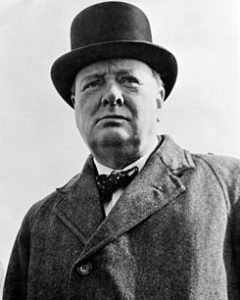 Courage is an attribute usually attributed to very ill people and people in extreme danger.
Courage is an attribute usually attributed to very ill people and people in extreme danger.
I mean, we need courage as we navigate a minefield, look danger in the face, or stare down a dire diagnosis for our future.
Courage isn’t usually thought of as a trait we need to navigate cubicles, look in the face of an angry Customer (or employee), or stare down a tough business challenge.
While there may be different kinds of courage, they share much more in common than you might think. Who better to ask about courage than Winston Churchill, who faced all of the situations (ok, he likely didn’t face cubicles) above and more.
In this quotation, he focuses on a key trait of courage that can apply to us in everyday life, and especially as a leader.
“Courage is what it takes to stand up and speak.
Courage is also what it takes to sit down and listen.”
– Winston Churchill, British Prime Minister and Statesman
Questions to Ponder
– Do you have the courage defined by Churchill?
– Which requires more effort for you as an individual?
– Which requires more effort from you as a leader?
Action Steps
1. Decide if now is a time to speak or be silent.
2. Take action on your decision.
(Hint – as a leader, sitting down and listening is likely more helpful more of the time.)
My Thoughts
However you want to define it, being an effective leader requires courage. You must face tough challenges, you must be consistent in words and actions, you must make tough decisions. All of these are a part of your role as a leader. But for today let’s look at Churchill’s point of view:
Sometimes you must stand up and speak out.
Sometimes you must sit down and shut up.
A wise leader reflects enough and decides which is the appropriate action in a given situation. A courageous leader takes the required action, even if it is hard, or isn’t their personal preference or first inclination.
I will leave the specific decisions, based on a given situation to you. While I could give you examples, there are no hard-and-fast rules. Rather than pontificating and preaching, I choose to sit down and stop typing.
It’s time for you to think about Churchill’s brand of courage and how, and when, you will apply it as a leader.

I so loved this post that I put it into practice immediately. I had already been pondering a specific situation for days. This post was the confirmation that I needed to stand up and speak even though I might be rejected. The risk of not speaking up was much more significant than speaking. Thanks for the post!